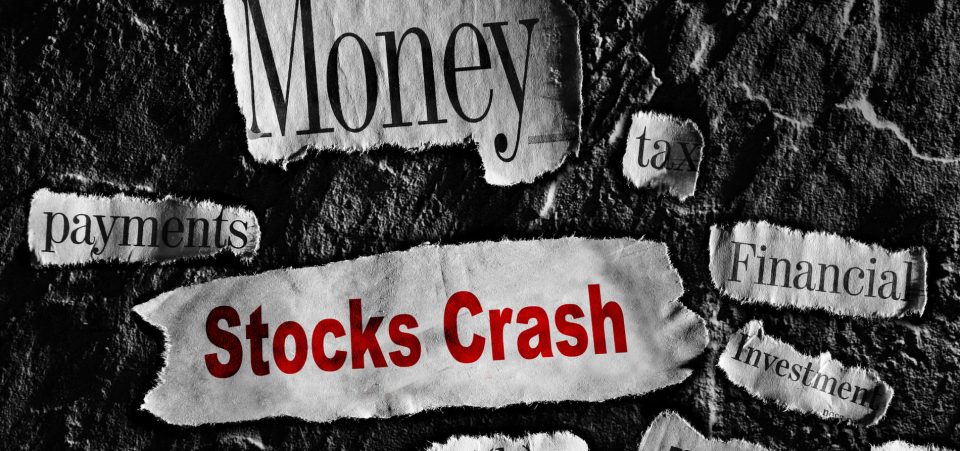It’s More Than a Correction, Nothing Can Stop a Major Stock Market Crash in 2018
The recent stock market events have been described as an overdue correction. But evidently, the reporting and analysis has not been sharp enough. Investors appear to gradually be getting back in. The market sent them a clear signal that a massive stock market crash is coming in 2018. Yet, they decided to stay or pick up some bargains.
The scenario is a lot like the joke of the stranded man, praying for help but refusing to take advantage of all the tools that God sent to save him. Until, of course, he died.
The stocks are sending many signals; they’re simply too highly priced. The world’s most successful investors are complaining that they will have to take up bigger cash positions because there are simply no reasonably priced (from the earnings perspective) stocks left. (Source: “Warren Buffett badly wants to make ‘huge’ acquisitions, but most companies are too expensive,” Business Insider, February 24, 2018.)
Tax Cuts Work…Sometimes
Those same uber-successful masters of finance are also claiming that they made huge profits from their Trump tax cuts. Thus, they have accumulated vast sums, which they can afford to invest. Yet, they choose not to do so.
Interest rates have been low for years, which has prompted many to make the understandable but ultimately bad idea to borrow to speculate on the stock market. So we have a situation where those who could invest have decided that conditions are too volatile.
Although many expect interest rates to go up soon, cheap debt abounds. It doesn’t take much imagination to see that the stock market rebounds have largely been fueled by the cheap debt. Too many investors interpreted the late January/early February dip on Wall Street as an open invitation to take out more debt and get back in.
More Las Vegas and Less Manhattan
“There are bargains to be had and big bucks to be made” could be the slogan of the present market. But neither of those two things are necessarily true. In fact, such interpretations are dangerous; they are signs of an incoming storm, which will likely have disastrous consequences for the American and other stock exchanges. Investors had their chance to get out.
But when the market looks more like the Las Vegas strip than it does downtown Manhattan, distortions of reality are inevitable.
One reason is that too many investors are not only choosing to ignore the financial and economic risks, they are ignoring the political risks that could disrupt the global markets. One such risk to Wall Street, as it happens, could emerge from closer to home than you might think: Washington D.C.
U.S policy has become both frightening and unclear. The impression is that President Donald Trump has been left free to roam the White House and make—often incoherent and inconsistent—policies. When candidate Trump became President Trump, something was lost in translation. The candidate wanted to pull the United States back from several foreign conflicts. But on Russia, North Korea, China, and Iran—not to mention Syria—Trump has expressed diametrically different notions.
Unpredictable Leadership
First, Trump wants to sit down with Kim Jong-un of North Korea to eat hamburgers together (maybe several hamburgers, judging by the size of their stomachs). Then, just as abruptly, he threatens to nuke North Korea.
Regardless of what you may think of Trump’s or Kim Jong-un’s ideas, politics, or culinary preferences, it’s clear that something has happened to Trump. Washington appears to have taken him “hostage” in a world of stale “Cold War” concepts. Most significantly, we have to wonder whether Trump is still the real president.
It appears that his generals, starting with James Mattis, are in charge of running big policy decisions and strategies. It wasn’t Trump, but Mattis, who thundered that the United States now considers “great power competition” as the heart of its defense (and in many ways, entire foreign policy) strategy. (Source: “U.S. military puts ‘great power competition’ at heart of strategy: Mattis,” Reuters, January 19, 2018.)
The Camp David retreat in early January may have provided an opportunity for the generals to quietly take over leadership from Trump. There’s a sense that a handful of foxes are now in charge of the henhouse.
The generals want a new Cold War. But it’s not necessarily Russia they’re after. After all, Moscow is a shadow of its Soviet self, even if, in the absence of U.S. leadership, Russia has been punching way above its weight. The target could be China, and North Korea is merely the gateway.
That’s a scary prospect. In the summer of 2017, many investors were acting as if they suddenly woke up. They reacted to a sharp escalation of tensions between Washington, Seoul, and Pyongyang. But, now, even though nothing has been resolved—in fact, North Korea has shown it has better missile technology than anyone imagined—everyone has forgotten. What could possibly go wrong?
Apart from any strategic and economic problems, which will be the subject of another article, the situation points to a major flaw. There is a discrepancy between the White House, its staff, and all the other organizational and administrative systems in the United States. And these appear to have decided to oppose the president.
Another way to look at the situation in the U.S. now is that it’s a ship—a very heavily armed one—without a commander. Worse, there are many different voices challenging each other for control. Some are speaking dangerous words.
Weak Political Situation Eventually Weakens the Markets
A massive political crisis, one not seen since Watergate, cannot be too far away. Investors should take precautions; instead, they’re doubling down. Trump risks impeachment, Russia or not. He faces far too many questions on issues that have nothing to do with Russia. One of those questions is about who’s actually in charge.
Such a scenario cannot last. It will be intolerable for one more year, let alone three more years and a potential re-election bid. Tax cuts or not, the Republicans are probably mulling over who should run in 2020.
Mike Pence has little chance of running against what should be a gung-ho and revamped Democratic Party—if they can ever decide to drop the Russiagate issue and focus on what Americans need. Moreover, there’s an atmosphere of mistrust among institutions and individuals in Washington that is driving the government’s focus away from politics, society, and the economy.
The result of this mess is that the United States, the world’s No. 1 economy (for the time being) risks becoming ungovernable. It was already dysfunctional, to be sure, but there was some agreement. Now there is only argument. The only things that have passed have been the tax cuts—pushed by a Republican majority—and the Jerusalem capital recognition. Neither of these two things will benefit the U.S. in the medium or long term.
Now, facing a massive deficit and a rising national debt, Trump plans to start focusing on infrastructure. What are the chances of tax cuts working in conjunction with a massive surge of public spending? We can look forward to frequent threats of government shutdowns.
At first, they may not do much to stocks but, before they start getting too old, the market will pick up the fact that it’s running without a foundation. Capitalism works, but it can’t sustain itself in anarchy. It needs rules or it becomes 1990s Russia—or the Wild West, if you prefer.






